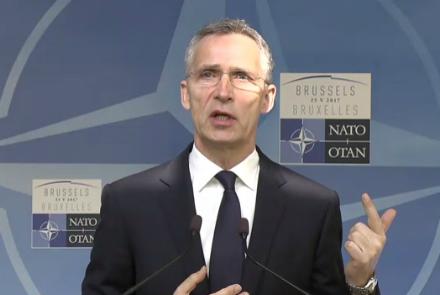NATO Secretary General Jens Stoltenberg said on Thursday that the key items on the day’s agenda at the heads of state meeting would be the fight against terrorism and fair burden sharing.
He also said that NATO would on Thursday decide on whether it will expand its support to the Global Coalition to Defeat ISIS (Daesh).
"... today, we will agree on NATO’s membership in the coalition," he said.
He said: “In a few hours, NATO leaders will gather here in Brussels for an important meeting at our new headquarters.
“We have two major items on our agenda: Stepping up NATO’s role in the fight against terrorism and fairer burden sharing in our alliance.”
He said NATO had been actively involved in the fight against terrorism for many years.
“Today, we will adopt an action plan to enhance NATO’s contributions. Our largest military operation ever was launched in Afghanistan in a direct response to the 9/11 terrorist attacks on the United States. 13,000 NATO troops continue to train Afghan forces.
“We will assess our level of support and the future of the mission. Training local forces is one of the best weapons in the fight against terrorism. We are already training Iraqi forces. And our AWACS surveillance planes provide information to the Global Coalition to Defeat ISIS (Daesh).”
Today, we will decide to expand our support to the coalition. With more AWACS flight-time, more information sharing and air-to-air refueling. All 28 Allies are members of the Global Coalition and today, we will agree on NATO’s membership in the coalition.
“This will send a strong political message of NATO’s commitment to the fight against terrorism. And improve coordination within the coalition. But it does not mean that NATO will engage in combat operations,” he said.
He went on to say that the alliance will also agree to establish a new terrorism intelligence cell at NATO headquarters. “Improving how we share intelligence, including on foreign fighters. And we will decide to appoint a coordinator to oversee NATO’s efforts in the fight against terrorism.
The other major topic he said would be discussed is that of “fairer burden sharing”.
“In 2014, all allies agreed to spend more and better on defense. Including moving towards investing two percent of GDP on defense within a decade.
He said “in 2016, total spending across Europe and Canada increased by billions of dollars. This is not just about cash. But also modern capabilities. And meaningful contributions to NATO’s missions, operations and engagements.
“Today, we will take steps to keep up the momentum. We will agree to develop national plans every year. These will set out how NATO Allies intend to meet their pledge. So that we continue to match words with action,” he said.
On Afghanistan Stoltenberg reiterated that NATO is in a non-combat role. He also said the decision on increasing troop levels will be taken next month.
In answer to a remark that NATO has helped Afghanistan for more than a decade but the country is still not stable , Stoltenberg said: “There are many challenges in Afghanistan and no one said that the situation in Afghanistan was going to be easy when NATO ended its combat operation back at the end of 2014. But we have achieved a lot.
“We have been able to train and build Afghan forces which are now able to take responsibility for security in their own countries themselves. That’s a great and important achievement. And the Afghans show professionalism and bravery in the way that they handle the security situation in Afghanistan,” he said.
Asked if there was a possibility of NATO carrying out another combat mission in Afghanistan, Stoltenberg said: “NATO will continue its train, assist, and advise mission in Afghanistan. And we will address that during the meeting today (Thursday). We will also later on this year decide on the exact two levels. We will not return back to a combat operation.
“Our aim is to train the Afghan forces to enable them to step up their efforts in stabilizing their own country, countering the Taliban, but also fighting different terrorist groups, including ISIS (Daesh). And again we have seen that Afghan forces, the special operations forces have been very effective in targeting and attacking ISIS and other terrorist groups in Afghanistan. NATO troops are not doing that, but we help and we train and advise Afghans in the fight against ISIS.”

This comes after he said on Wednesday that Russia must support an Afghan-led peace process.
This was in answer to a question on Russia’s recent contact with the Taliban, which was posed by TOLOnews’ Lotfullah Najafizada at a press conference.
"The aim is to reconcile and find a negotiated solution. And this has to be an Afghan-led peace process.
"We have seen reports (of Russia’s contact with the Taliban), but haven’t seen any proof of direct support to the Taliban from Russia,” he added.
Also asked on Wednesday what he expects from an increase in troops in Afghanistan, especially with Daesh being so strong in the country and the fact that they are not necessarily directly related to Daesh in the Middle East, Stoltenberg said the situation in Afghanistan today is very different to that a few years ago.
He said NATO and the U.S has been able to build up a strong Afghan national army and security force.
The security forces "have proven capable and professional and have proven able to fight the many different types of terrorist groups, including ISIS (Daesh) in Afghanistan" .
But Stoltenberg emphasized that the aim of NATO in Afghanistan is to find a politically negotiated peace solution.
Leaders of NATO countries are set to convene in Brussels on Thursday for a special meeting to discuss the fight against terrorism and the alliance’s defense spending.
U.S President Donald Trump will also attend the heads of state meeting, which will be his first visit to NATO’s headquarters. He is expected to call on NATO alliance members to share the burden of defense spending and increase this to at least two percent of their GDP.
Ahead of the meeting, Stoltenberg said the mission in Afghanistan would be discussed at a three-hour long meeting on Thursday afternoon.
NATO is expected to commit about 1,500 troops in addition to 3,000 U.S troops to Afghanistan – on the back of a request by NATO commander in Afghanistan Gen John Nicholson earlier this year.
The decision however has been delayed as certain countries, and some senior U.S officials, have questioned whether an increase in troop numbers would change the course of the war in Afghanistan.
NATO is currently trying to convince its allies that a few thousands more troops will help.
NATO defense chiefs are expected to meet next month to finalize the troop commitment to Afghanistan.


